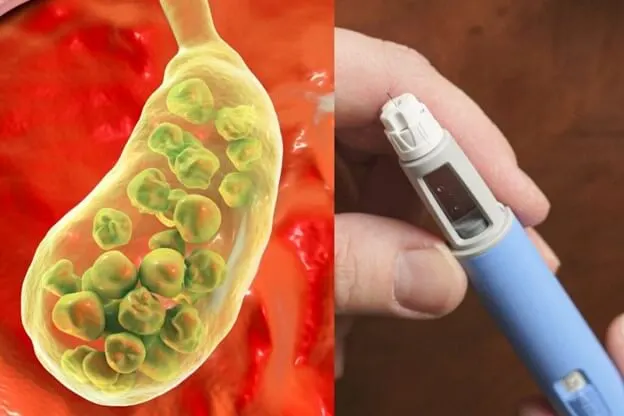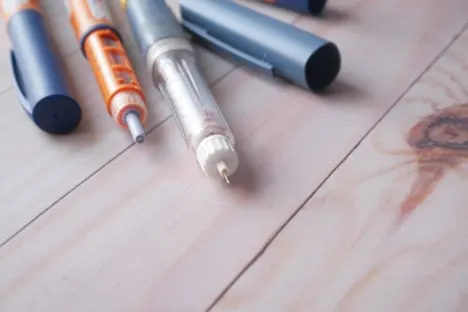Ozempic has become a popular medication in recent years. Primarily prescribed to manage type 2 diabetes, it helps regulate blood sugar levels.
Lately, there’s been a surprising development: gallstones. Sadly, this seems to be a common medical complication among Ozempic users.
While Ozempic offers significant benefits for diabetes management, understanding this potential side effect is crucial. Let’s dive deeper into how Ozempic works and why it might be linked to gallstone formation.

Understanding Gallstones
A small, pear-shaped hero called the gallbladder is tucked away beneath our liver. This unsung champion plays a vital role in digestion, explicitly targeting fats. It acts like a storage tank for bile, a yellowish liquid produced by the liver. Bile is a powerful emulsifier that breaks down fat molecules into tiny droplets, making them easier for our bodies to absorb.
However, sometimes things go awry inside this storage tank. When bile components like cholesterol or bilirubin (a waste product from red blood cells) become too concentrated, they can clump together and harden, forming gallstones. These gallstones can be as small as a grain of sand or as large as a marble. There are two main types:
- Cholesterol gallstones: The most common culprit is when cholesterol levels in the bile rise too high.
- Pigment gallstones: Less frequent; these occur when bilirubin levels are abnormally high in bile.
Ozempic and its Effect
Ozempic works like a secret weapon against high blood sugar. It belongs to a class of drugs called glucagon-like peptide-1 (GLP-1) receptor agonists. Here’s the trick: our bodies naturally produce GLP-1, a hormone that tells the pancreas to release insulin (which helps move sugar out of the bloodstream) and instructs the liver to slow down sugar production. Ozempic mimics this GLP-1 action, effectively lowering blood sugar levels.
While Ozempic is a game-changer for diabetes management, recent studies suggest a potential side effect: changes in bile composition. Research shows that a small percentage (around 0.5% to 1.4%, depending on dosage) of Ozempic users experience increased cholesterol levels. This rise in cholesterol and other factors might contribute to the observed increase in gallstones.
The Gallstone Connection
The link between Ozempic and gallstones is a fascinating area of ongoing research. Here’s the theory: as mentioned earlier, Ozempic can lead to slightly elevated cholesterol levels in some users.
Remember, cholesterol is a major component of cholesterol gallstones. When bile cholesterol levels rise, it throws the balance of bile components out of whack. This can cause cholesterol to come out of solution and form crystals, eventually forming gallstones. Studies suggest that around 20-40% of adults with gallstones have high cholesterol levels.
It’s important to note that Ozempic isn’t the only factor at play. Rapid weight loss, a potential side effect of Ozempic for some users, can also increase the risk of gallstones. This rapid change can destabilize bile composition and promote gallstone formation.
Evidence and Research
Several studies have raised a red flag regarding a potential association between Ozempic and gallstones. Clinical trials involving the drug observed a higher incidence of gallstones in participants taking Ozempic than those receiving a placebo. The observed risk varied slightly depending on the dosage used.
One critical study exploring the link between Ozempic and gallstones is a research letter published in the respected medical journal JAMA Internal Medicine in August 2022. This research, conducted by the Food and Drug Administration (FDA), analyzed data from the FDA Adverse Event Reporting System (FAERS). The study found that individuals using Ozempic for type 2 diabetes displayed a significantly higher rate of gallbladder problems, particularly acute gallbladder disease (acute cholecystitis).
Management and Considerations
If you’re experiencing potential gallstone symptoms like sudden and intense upper abdominal pain, nausea, or vomiting, consulting your doctor is crucial. Early diagnosis and treatment can help prevent complications. Depending on the severity, treatment options for gallstones might include medication, minimally invasive surgery to remove the gallbladder, or lifestyle changes.
Your doctor should decide whether to continue Ozempic. They can assess your individual risk factors for gallstones, weigh the benefits of Ozempic for diabetes management, and explore alternative treatment options if necessary. Open communication with your doctor is key to making informed decisions about your health.

Ongoing Research and Future Developments
The scientific community is actively investigating the link between Ozempic and gallstones. Researchers are diving deeper into the exact mechanisms at play and exploring ways to mitigate this side effect.
While future developments are still in progress, the ongoing research holds promise for improving our understanding and potentially leading to new treatment strategies for diabetes and gallstones. Remember to file a lawsuit with the help of a lawyer if you have been victim of Ozempic.

Jessi is the creative mind behind The Coffee Mom, a popular blog that combines parenting advice, travel tips, and a love for all things Disney. As a trusted Disney influencer and passionate storyteller, Jessi’s authentic insights and relatable content resonate with readers worldwide.
